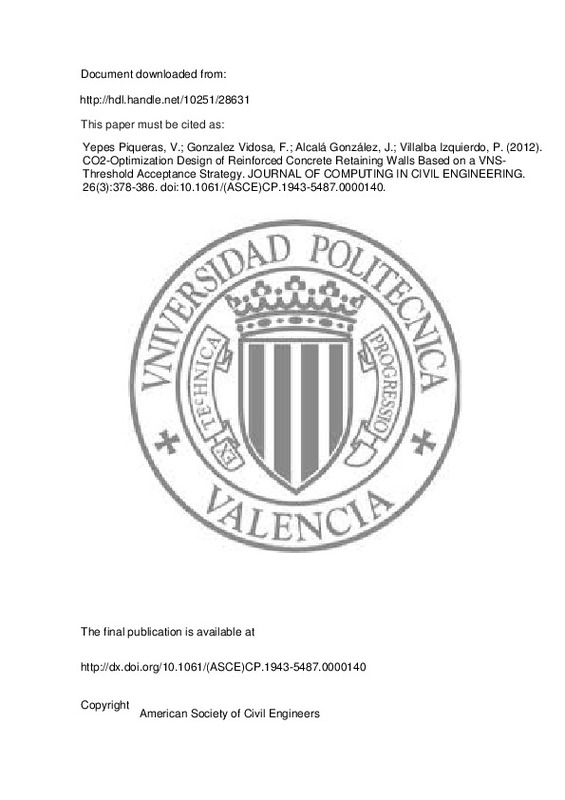Yepes Piqueras, V.; González Vidosa, F.; Alcalá González, J.; Villalba Izquierdo, P. (2012). CO2-Optimization Design of Reinforced Concrete Retaining Walls Based on a VNS-Threshold Acceptance Strategy. Journal of Computing in Civil Engineering. 26(3):378-386. https://doi.org/10.1061/(ASCE)CP.1943-5487.0000140
Por favor, use este identificador para citar o enlazar este ítem: http://hdl.handle.net/10251/28631
|
Título:
|
CO2-Optimization Design of Reinforced Concrete Retaining Walls Based on a VNS-Threshold Acceptance Strategy
|
|
Autor:
|

 Yepes Piqueras, Víctor
Yepes Piqueras, Víctor
 González Vidosa, Fernando
González Vidosa, Fernando

 Alcalá González, Julián
Villalba Izquierdo, Pere
Alcalá González, Julián
Villalba Izquierdo, Pere
|
|
Entidad UPV:
|
Universitat Politècnica de València. Departamento de Ingeniería de la Construcción y de Proyectos de Ingeniería Civil - Departament d'Enginyeria de la Construcció i de Projectes d'Enginyeria Civil
Universitat Politècnica de València. Instituto de Ciencia y Tecnología del Hormigón - Institut de Ciència i Tecnologia del Formigó
|
|
Fecha difusión:
|
|
|
Resumen:
|
This paper presents one approach to a methodology to design reinforced concrete cantilever retaining walls for road construction using a hybrid multistart optimization strategic method based on a variable neighborhood ...[+]
This paper presents one approach to a methodology to design reinforced concrete cantilever retaining walls for road construction using a hybrid multistart optimization strategic method based on a variable neighborhood search threshold acceptance strategy (VNS-MTAR) algorithm. This algorithm is applied to two objective functions: the embedded carbon dioxide (CO 2) emissions and the economic cost of reinforced concrete walls at different stages of materials production, transportation, and construction. The problem involved 20 design variables: four geometric variables (thickness of the stem and the base slab; toe and heel lengths), four material types, and 12 variables for the reinforcement setup. Results first indicate that embedded emissions and cost are closely related and that more environmentally friendly solutions than the lowest cost solution are available at a cost increment of less than 1.28%. The analysis also indicated that reducing costs by 1 Euro could save up to 2.28%kg in CO 2 emissions. Finally, the cost-optimized walls require approximately 4.8% more concrete than the best environmental ones, which need 1.9% more steel. © 2012 American Society of Civil Engineers.
[-]
|
|
Palabras clave:
|
CO 2 emission
,
Optimization
,
Retaining walls
,
Sustainable construction
,
Base slab
,
Cantilever retaining walls
,
Cost increment
,
Cost solutions
,
Design variables
,
Economic costs
,
Environmentally-friendly
,
Geometric variables
,
Materials production
,
Multistart optimization
,
Objective functions
,
Optimization design
,
Reducing costs
,
Reinforced concrete wall
,
Variable neighborhood search
,
Algorithms
,
Carbon dioxide
,
Costs
,
Design
,
Reinforced concrete
,
Cost benefit analysis
|
|
Derechos de uso:
|
Reserva de todos los derechos
|
|
Fuente:
|
Journal of Computing in Civil Engineering. (issn:
0887-3801
)
|
|
DOI:
|
10.1061/(ASCE)CP.1943-5487.0000140
|
|
Editorial:
|
American Society of Civil Engineers
|
|
Versión del editor:
|
http://dx.doi.org/10.1061/(ASCE)CP.1943-5487.0000140
|
|
Código del Proyecto:
|
info:eu-repo/grantAgreement/GVA//GV%2F2010%2F086/
info:eu-repo/grantAgreement/UPV//PAID-06-09/
|
|
Agradecimientos:
|
This work was supported by the Generalitat Valenciana (Research Project GV/2010/086) and by the Universitat Politecnica de Valencia (Research Project PAID-06-09). The authors are grateful to the anonymous reviewers for ...[+]
This work was supported by the Generalitat Valenciana (Research Project GV/2010/086) and by the Universitat Politecnica de Valencia (Research Project PAID-06-09). The authors are grateful to the anonymous reviewers for their constructive comments and useful suggestions. The authors are also grateful Dr. Debra Westall for her thorough revision of the manuscript.
[-]
|
|
Tipo:
|
Artículo
|







![[Cerrado]](/themes/UPV/images/candado.png)


